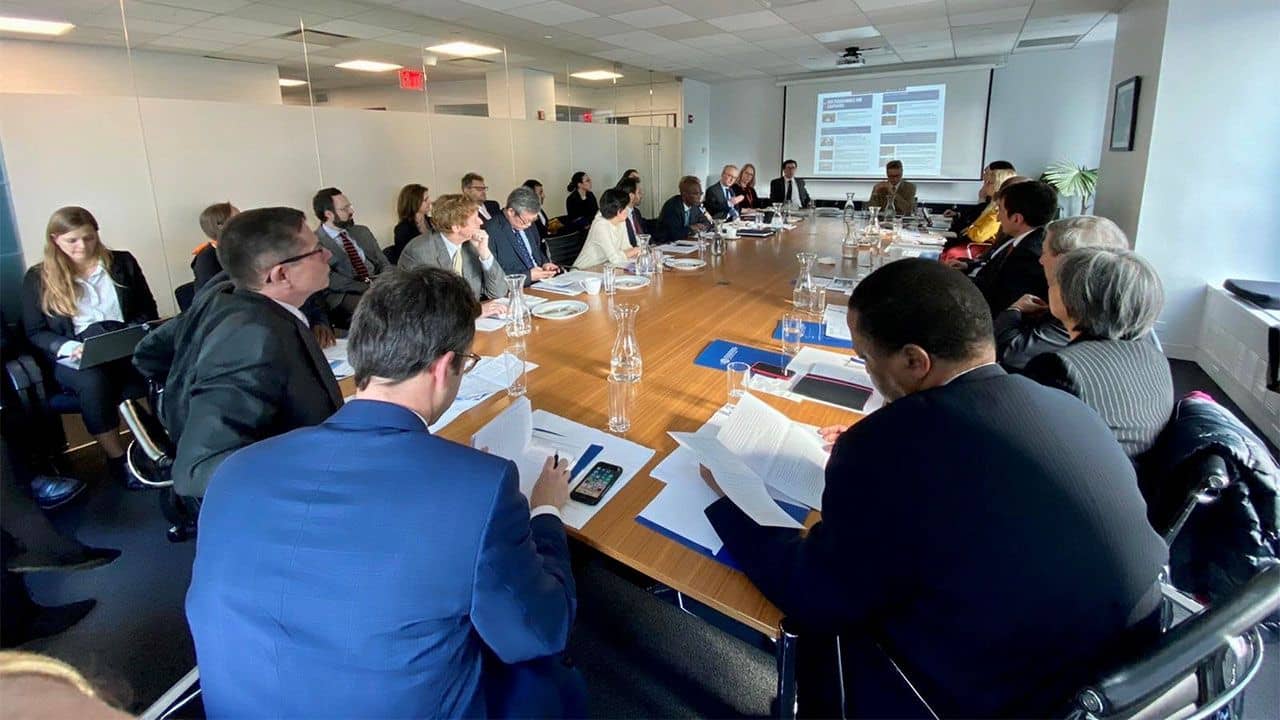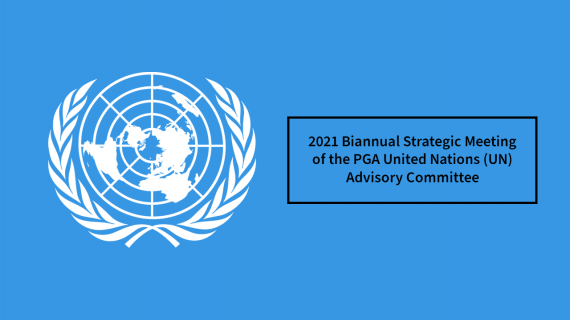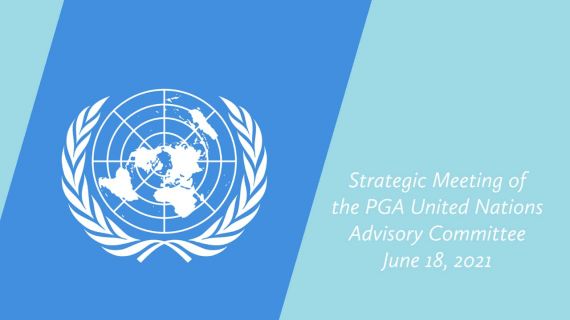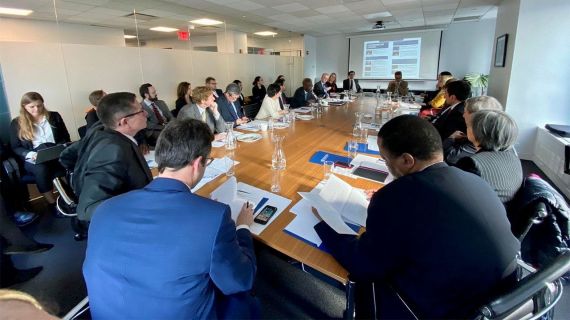
On 12 February 2020, the Permanent Mission of Liechtenstein under the leadership of Amb. Christian Wenaweser, hosted the first 2020 PGA UN Advisory Committee meeting. This meeting aimed at updating leaders of the UN system on 2019 results and 2020 plans for all PGA Campaigns and to discuss the role of Parliamentarians in supporting and implementing the UN agenda at the national level. The interactions were noteworthy and insightful, as participants discussed opportunities and challenges to the implementation of the UN agenda, with significant challenges in the fields of international peace and security, international law and human rights, gender equality and democracy, and the protection of the oceans.
The Secretary-General of PGA, Dr. David Donat Cattin, presented an overview of the 2019 activities and updates on the implementation of the 2019-2021 Strategic Plan, entitled Mobilizing Legislators as Champions for Human Rights, Democracy and Peace.
Prof. Enrico Milano, Legal Adviser of Italy and Amb. Silvio Gonzato, Deputy Head of the Delegation of the European Union laid emphasis on the importance of maintaining and increasing support for the United Nations moratorium on the death penalty, including in relations to countries that abstained or opposed the 2018 UNGA resolution on a moratorium. The PGA SG stressed that PGA may make a difference in some selected States, including The Gambia, where PGA members have been advocating to remove the death penalty.
Mr. Adama Dieng, Under-Secretary-General and Special Adviser of the UN Secretary-General on the Prevention of Genocide made a plea to States to recognize the importance of the Responsibility to Protect (R2P), applauded PGA’s continued efforts to universalize international treaties with relevance to atrocity-prevention including the Arms’ Trade Treaty (ATT), and called for States’ leadership in the prevention of gross human rights’ abuses worldwide. Mr. Dieng underscored that the situation in Yemen is of particular concern. In this respect, the PGA SG stressed that PGA members issued statements in support of a robust prevention framework in the widest number of countries possible as well as a strong Rome Statute system, which allows investigations and prosecutions of individuals responsible of international crimes when relevant States are unable or unwilling to do so. PGA Members from Yemen recently made an urgent call to receive humanitarian assistance and international cooperation to halt the atrocities committed by all sides against the civilian population. During the debate Mr. Dieng reiterated that a convention on crimes against humanity would be needed in light of the lack of verification mechanisms, while noting the lack of progress on the relevant draft produced by the International Law Commission at the last UN General Assembly session. The PGA SG reaffirmed the firm support of Parliamentarians from the PGA network for the convention of crimes against humanity and stressed that PGA dynamically endorses any initiative to reduce the impunity gap, including the Mutual Legal Assistance (MLA) treaty proposed by The Netherlands with Argentina, Belgium, Mongolia, Senegal and Slovenia. Lawmakers have oversight prerogatives and can mobilize their constituents to shift policies of governments, also in connection with treaty-negotiation processes.
In the current context, vulnerable populations, including women and children are at risk of falling prey to violence, while the SDGs 5 and 16 respectively advocate for gender equality and peaceful, just and inclusive institutions. PGA members have taken action to end Child, Early and Forced Marriage (CEFM) despite challenges, including the lack of funding. Amb. António Gumende, Permanent Representative of Mozambique reported a positive development – the Mozambican Parliament voted a new law prohibiting CEFM. This legislation was strongly supported by the PGA Mozambique National Group. Ms. Catherine Boucher, Counsellor (Legal and Social Affairs) of Canada explained that there is wide support for the end of CEFM. In the same vein, Amb. Gonzato mentioned that CEFM remains a priority of the EU as part of its envelope of 500 million euros to address violence against women. PGA emphasized that in many countries laws are already in place to protect the girl child, but challenges remain on socializing the norms to progressively operate a mentality shift. In this regard, the role of parliamentarians as leaders in their communities are of vital importance.
In the framework of the PGA campaign against discrimination based on Sexual Orientation and Gender Identity (SOGI), Amb. Gonzato suggested that PGA could engage with the UN Independent Expert on sexual orientation and gender identity. PGA encourages UN member States to join the UN LGBTI Core Group, among other actions. PGA members advocate with their officials to foster political will to join the Group.
The PGA Oceans campaign although very targeted to the promotion of the IMO Cape Town Agreement (CTA), ILO Work in Fishing Convention, and Port State Measures Agreement is susceptible to expansion. Amb. Jan Kickert, Permanent Representative of Austria, Amb. Cheikh Niang, Permanent Representative of Senegal, Ms. Aahde Lahmiri, Counsellor of Morocco, and Prof. Milano had questions and updates on specific areas of concern to UN member States, such as deep seabed mining, the impact of climate change on biodiversity and rising sea-levels. As a result of the Praia Plan of Action, the work of PGA on SDG 14 will be expanding, inter alia to plastics pollution and deep seabed mining. Delegations expressed strong support to PGA in this area of work and encouraged the Secretariat to engage with the International Seabed Authority (ISA) on the exploration and exploitation of deep seabed mining, regarding which Parliamentarians can have a positive influence towards the protection of biodiversity and the natural habitat as common heritage of humankind. PGA was also encouraged to work on draft recommendations to the ISA and raise awareness on the impact of climate change on economic rights of indigenous people.
Amb. Susan Eckey, Representative to the ECOSOC, of the Permanent Mission of Norway and Amb. Kickert emphasized that SDG 16 is of utmost importance for the Rule of Law, peace and security. The Norwegian representative noted that in order to end impunity, we have to strengthen the rule of law domestically. In this sense, PGA empowers its membership to fully promote the ratification and implementation of the Rome Statute of the International Criminal Court (ICC). Additionally, Voluntary National Reviews (VNRs) will be held in July 2020 at the UN High Level Political Forum. 50 countries will participate, including 27 first-time presenters, 22 second-time presenters and 1 third-time presenter.
On the threat of nuclear weapons and their humanitarian effects, PGA was originally created around nuclear disarmament. The organization has moved towards a broader framework of for universality and implementation of the Biological Weapons Convention (BWC) and the UNSC Resolution 1540 on weapons of mass destruction. In its Peace and Security Program, PGA explores ways and addresses means to increase the involvement of women parliamentarians in security and disarmament issues and how such engagement may positively impact on sustainable peace.
Ms. Izumi Nakamitsu, UN High Representative for Disarmament Affairs, in her remarks, welcomed the leading role of PGA Members in the universalization of the Biological Weapons Convention (BWC) and explained that several countries are not appropriately funding disarmament mechanisms, although the international community is obligated to do so. On small arms and light weapons, Ms. Nakamitsu recognized that they are at the center of every armed conflict. She informed the PGA UN Committee on progress concerning the process in China joining the Arms Trade Treaty (ATT). China is currently preparing domestic legislation to this effect. She highlighted the importance of countries implementing ATT policies at national and regional levels. Member States need to develop national strategies and targets. Parliamentarians, including PGA members are critical to achieving domestic implementation. In respect of the risk of proliferation amongst non-state actors, there is a widespread concern over the use of armed drones and the future of disarmament. The UN Disarmament Commission was unable to meet in 2019 due to US visa restrictions, which is likely to reoccur in 2020. The Executive Committee of PGA will be discussing the issue of insufficient international regulation on armed drones at the upcoming Board meeting in May 2020.
On the fight against impunity front, the upcoming election of judges and the Prosecutor at the ICC was highlighted by Mr. Dominique Favre, Deputy Permanent Representative of Switzerland, who introduced an event where countries shared their best practices and election procedures. PGA highlighted the importance of countries voluntarily submitting the most qualified applicants to these positions so that the ICC can fully and efficiently function, and praised Liechtenstein for having submitted proposals to the Assembly of States Parties of the Rome Statute that, if accepted, would have provided an incentive for States to issue Public Calls for Applications with pre-established, merit-based criteria for the national nomination of the most qualified judicial candidates. PGA was asked to offer future opportunities for public debate on the process of ICC judicial elections, and the PGA SG assured that this issue will be considered in the agenda of the 11th Consultative Assembly of Parliamentarians on the ICC & the Rule of Law (CAP-ICC), within the framework of the PGA Annual Forum to be hosted by the Parliament of Argentina in Buenos Aires in November 2020. PGA also circulated a call to its membership in State Parties to the Rome Statute to open a public call for applications in countries that will want to have a judicial candidate (N.B.: The ICC Judges are 18, and 6 positions will be open at the end of 2020, but the States Parties to the Rome Statute are 123, including Kiribati that joined in 2019 thanks to the leadership effort of a PGA Member-Parliamentarian from Kiribati.)
Dr. Agnes Callamard, UN Special Rapporteur on Extra-Judicial, Summary or Arbitrary Executions, offered key insights on the recent killing of an Iranian high-official in Iraq. Indeed, the use of armed drones will be the subject of her upcoming report in June 2020. This killing was carried out in retaliation for acts committed by proxy parties. It did not appear to be carried out as an act of self-defense, as there was no imminent threat. It appeared to have been conducted on the basis of a theory of deterrence. In the extremely interesting debate that followed Dr. Callamard’s critical presentation, participants partly shared views that reflects how actors in the international community are approaching delicate matters such as the definition of an international armed conflict and the purported applicability of international humanitarian law, while being not explicit in recognizing the unlawfulness of armed reprisals outside the framework of an active armed conflict. At the UN level, there is no established authority to determine whether a given situation is an international armed-conflict or not. To some extent, the UN Security Council could be an instance deciding on such legal qualifications, but there is a vacuum that needs to be addressed.
In his closing remarks, Ambassador Wenaweser highlighted the importance of civil society and that States should partner with NGOs such as PGA to tackle topics of importance to all.






